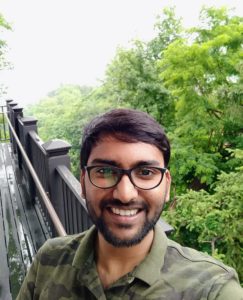10 out of 200: For a better tomorrow – Anmol Kabra applies machine learning to sustainability problems

Meet Anmol Kabra, computer scientist and one of this year’s 10 out of 200 young researchers participating in the 7th Heidelberg Laureate Forum from September 22nd -27th, 2019.

What are your name and nationality?
My name is Anmol Kabra and I’m from India.
Where did you study and where are you currently based?
I completed high school in Patna, Bihar, India. I’m currently based in Ithaca, New York, United States.
What is your current position?
I’m a senior (4th year) undergraduate student in Computer Science at Cornell University.
What is the focus of your research? What is your research project?
I’m interested in understanding Machine Learning models and why they work. Furthermore, I’m interested in interdisciplinary research in CS, specifically in Machine Learning, targeted towards solving sustainability problems.
Throughout my undergraduate career, I have worked on several research projects. The most prominent project was to develop a fast and scalable Machine Learning framework for incentivizing citizens to complete scientific tasks in crowdsourcing programs. By strategically distributing incentives, scientists could reduce sampling bias and improve the data’s quality for scientific modeling. In a project in Natural Language Processing last summer, I worked on understanding dialog similarity and devising good embeddings for dialogs. Before that, I also worked on predicting chemical crystals from diffraction spectrograms and creating embeddings for elements. My work has been quite interdisciplinary so far, and loosely driven by sustainability problems.
Why do you want to become a computer scientist?
I was interested in Environmental Engineering and Waste Management in high school, but I soon realized that Computer Science had an overarching influence on many fields and adapted a more general approach to problem-solving. I like how complex problems can be broken into simpler ones and be solved at scale. My interest in Computer Science originated from this idea, supplemented by my professors’ and peers’ support. With the field becoming increasingly interdisciplinary, I think it’s a great time to be in Computer Science.
What are some of the fundamental challenges you have faced in your academic career?
I have struggled with communicating my findings and keeping up with the pace of Machine Learning research. In the recent deluge of amazing research, it has been challenging for me to distinguish promising research from mainstream, insignificant contributions. I also find it hard to identify when a research idea is worth pursuing and when it’s not, but I hope to learn this skill from experience and with time.
What do you feel are the greatest pressures facing scientists today?
Communicating science to policy makers and the public remains a challenge, and increasingly so, in these times of targeted misinformation and corporate greed. Great scientific advances are being made every day, but they get swept under the rug due to various factors. We as scientists have a responsibility to make our work known and influential in shaping humanity’s future, and I feel that this pressures many scientists.
What are you doing besides research?
I like to play table-tennis, hike, bike, and follow Formula 1. I also enjoy reading non-fiction books and watching documentaries.
How did you hear about the HLF and why did you apply?
I heard about it on the internet and from a professor who I took a class with. Since this was my last year as an undergraduate and I didn’t want to miss this opportunity, I thought that applying was worth a shot.
What do you expect from this meeting?
I hope to consult senior researchers on how they conduct research and what types of questions they ask. I am also excited to meet fellow young researchers, who I could collaborate with and learn from. Interacting with people from around the world will be insightful.
Which laureates present at the forum would you really like to talk to and what do you want to ask them?
I would be honored to interact with Yoshua Bengio, who is increasingly interested in using AI to solve sustainability problems and ameliorate climate change. I would also like to ask him how application areas can help advance AI, in ways other than serving as test-beds for algorithms. Moreover, I’m currently reading Leslie Valiant’s 1994 book Circuits of the Mind, and I’m interested in asking Valiant’s views on how his proposed theories fit into or conflict with the developments in AI we have seen recently.
Who were your most important mentors and what lessons did they pass on to you?
My family has always supported me, left space to explore and grow, and encouraged me to persevere when I failed. In college, my first research mentors, Yexiang Xue, and Carla Gomes, showed faith in me when I worked on research projects and challenged my skills. I also owe gratitude to some of my high school friends, teachers, and college professors, who have helped make learning fun.
What did teaching others teach you about yourself?
Teaching has not only helped me empathize with the different paces and ways others learn but has also made me introspective and self-aware of the challenges I faced when learning something. Teaching is also adventurous, as the same explanation or method almost never works for different students, and there are endless opportunities for innovation in communication. This way, teaching keeps me on my toes and makes learning exciting.

